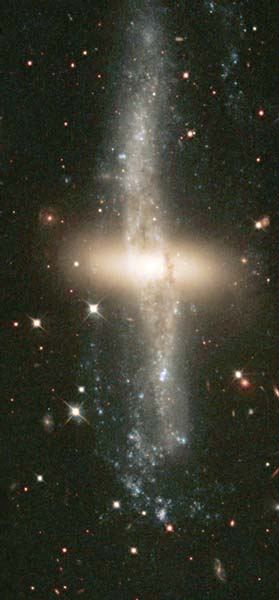
|
Explanation: NGC 4650A appears to be two galaxies in one. A rare type of galaxy known as a Polar Ring, NGC 4650A is composed of an old central group of stars and a young ring of stars rotating farther out. Both components are clearly visible in this featured photograph by the Hubble Space Telescope. What creates Polar Ring Galaxies is still being researched, but a leading theory is the collision of two distinct galaxies in the distant past. Polar Ring Galaxies allow astronomers to estimate the amount of dark matter in galaxies by measuring the rotation rate of the highly extended ring. An unknown type of dark matter is implied because the ring typically rotates too fast to be held together by only the visible stars.
|
January February March April May June July August September October November December |
| |||||||||||||||||||||||||||||||||||||||||||||||||||||||
NASA Web Site Statements, Warnings, and Disclaimers
NASA Official: Jay Norris. Specific rights apply.
A service of: LHEA at NASA / GSFC
& Michigan Tech. U.
Based on Astronomy Picture
Of the Day
Publications with keywords: ring galaxy - polar ring - dark matter - ring
Publications with words: ring galaxy - polar ring - dark matter - ring
See also:
- APOD: 2025 July 14 Á NGC 2685: The Helix Galaxy
- LEDA 1313424: The Bullseye Galaxy
- APOD: 2024 December 18 Á NGC 660: Polar Ring Galaxy
- APOD: 2024 October 20 Á Dark Matter in a Simulated Universe
- APOD: 2024 February 18 Á Hoags Object: A Nearly Perfect Ring Galaxy
- APOD: 2024 January 1 Á NGC 1232: A Grand Design Spiral Galaxy
- APOD: 2023 September 13 Á NGC 4632: Galaxy with a Hidden Polar Ring
